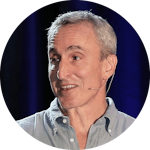Lanserad den här veckan: Diet Doctors podcast!
Dr Bret Scher, kardiolog från San Diego, håller i podcasten och i den korta intervjun som kan ses ovan berättar han om vad som kommer att hända, sin egen historia, vem podcasten är för och vilka våra första gäster är. Intervjun är på engelska (utan svensk text) och öppen för alla att se. Längre ner finns en innehållsförteckning på svenska och även en transkription (på engelska).
Uppdatering 2018-10-31: Intervjun finns nu med svensk text och transkription: Att lansera Diet Doctor Podcast
Vi har drömt om att göra en podcast i flera år och nu är det alltså dags. Det känns mycket spännande! Första avsnittet hittar du här:
Ljud och video: Diet Doctor Podcast: #1 Turning science upside down – Gary Taubes
Innehåll
0:00 Introduktion
1:15 Brets historia och varför den preventiva delen av hans utbildning var viktig.
2:10 Varför har du lämnat konventionell behandling med fettsnålt och statiner?
3:30 Vilka hälsovinster har dina patienter gjort efter att du började behandla med low carb?
5:07 Har det okonventionella valet av behandlingsmetod givit dig problem?
6:10 Brets egen LCHF-berättelse.
7:35 Hur började du med podcasting?
8:23 Hur Brets attityd till podcasting har förändrats över tid.
9:35 Vem har varit din favoritgäst, hittills?
10:42 Varför har du valt att lämna din egen podcast för Diet Doctors?
12:08 Vilka gäster kommer vi att få träffa?
13:25 Vem borde lyssna?
14:02 Mer information om Brets blogg, podcast och bok.
Transkription
Dr. Andreas Eenfeldt: Dr. Bret Scher is a cardiologist and he’s been treating patients with low-carb diet for over five years. Now he’s getting ready to start a Diet Doctor podcast with us. So who is Dr. Scher and what will the podcast be about? Let’s find out.
I am Andreas Eenfeldt from DietDoctor.com and I’m here with Dr. Bret Scher. Bret, thank you for being here.
Dr. Bret Scher: Oh, it’s my pleasure, Andreas. Thanks for having me.
Andreas: So a Diet Doctor podcast, that is really exciting I think…
Bret: It’s very exciting. I couldn’t tell you how excited I am to start this project. I believe so much in the mission of Diet Doctor making low-carb simple and I think that’s so important to get out to the community.
But not so simple that you are not also still looking at the science critically and that’s where I hope I can lend some of my expertise and my knowledge and just guide this podcast along so that we’re looking critically at the science but still making it easy enough for people to understand, where they are walking away with practical tips.
And we’re going to get some great guests who have a lot of knowledge in this field to really help people and really help them live their lives in a healthier way.
Andreas: Dr. Bret Scher, can you give us your backstory?
Bret: Sure, I’d be happy to. So I’m a cardiologist right now in San Diego and part of my cardiology training was a combined preventative and integrative as well as a general cardiology fellowship. So I feel I’ve really benefited from having that extra layer of training in prevention.
And that really sort of set me up to make this transition to focus more on nutrition, specifically low-carb nutrition, because from the beginning I thought differently than the average cardiologists because I was a little less focused on the stents and the medication and more focused on the lifestyle from the beginning.
So as I transition through my cardiology practice and as I started my own preventative wellness center, that’s when I started to get introduced to the whole low-carb world. And I have to be honest, as a cardiologist, even a preventive cardiologist, the low- carb world was still a little foreign to me in the beginning and a little uncomfortable.
Andreas: It’s not what you expect from cardiologists, treating heart disease.
Bret: Right.
Andreas: You expect… I do at least, and I think a lot of people do… Most of them say you should be on a low-fat diet, you should worry about cholesterol, let’s put you on a statin drug and so on, right?
Bret: That’s the usual protocol, low-fat diet and statin drugs. And just as I experienced more of what a low-carb high-fat diet can do for many patients and as I read more of the literature that’s out there that isn’t talked about very much I realized how powerful this is and I saw with my own eyes the benefits of it and that’s when I started the transition.
I will admit, it was a slower transition at first starting about five years ago, but then as I got more comfortable with it and realizing I didn’t have to worry about the things I was worried about.
Andreas: What were you worried about? What are the doctors worried about?
Bret: Well, one, what are the other doctors going to think? And what if something goes wrong? Will I be legally liable? And you have to develop your own comfort in how you discuss it with the patients. And unfortunately I still have to have a discussion saying, ”This is not based on guidelines this is not standard of care, but we have plenty of reason to believe that the guidelines and the standard of care need to change.
Andreas: So what kind of effects or benefits did you see when you start treating patients like this?
Bret: I see so many patients with heart disease but there’s such overlap with cardiovascular disease, diabetes, metabolic syndrome, insulin resistance. It’s all so interrelated. And when you can start using a low-carb diet as part of your toolkit as something you can use to help patients, right away you see the insulin resistance reverse, you see the metabolic syndrome reverse and the diabetes improve.
And all that has beneficial effects on the lipid parameters as well, but not the usual lipid parameters that people like to talk about, not just the LDL number. But if your HDL is going up and your triglycerides are going down and the small dense LDL is going down and the lipid oxidation is going down, all these are profoundly beneficial for cardiovascular health.
So at first I was sort of focusing on the weight and the insulin resistance and then I started seeing all these benefits with the lipids as well and then I was sold after that. Because when you can see the whole package improved like that… And then to be honest, I mean people felt better, people had more energy, they weren’t hungry, they weren’t worried about food all the time.
And that’s important too because whatever diet you want somebody to be on it has to be sustainable and it has to fit into their life in an enjoyable way. And when I saw how easy it was for so many patients to go low-carb and enjoy being low-carb for me then that was sort of the clincher that it was something I had to do.
Andreas: Did you end up in any trouble with colleagues or other people in your clinics? When you got started, did people think you were crazy?
Bret: Fortunately I can say I didn’t get into any trouble. Now if people thought I was crazy or not that’s a different story. I’m sure a lot of people do because a lot of people still believe the common beliefs out there, the common teachings that we do need to avoid saturated fats, that LDL is the most important thing and that even regardless of any benefits they are still worried that saturated fat is going to increase the risk of heart disease.
So a lot of people still look at me a little differently for the way I practice, but I’m okay with that because I look at them a little differently for the way they practice. And it’s all evolving and I think people are going to catch on more and more, a lot with the work that you’re doing, with your site for medical providers and the CME conferences for medical providers about low-carb.
And it’s starting to change. And I definitely can even say in the past five years that I’ve been involved with this I’ve seen a change more and more and the rate at which it’s changing is definitely increasing.
Andreas: So do you have a story yourself with low-carb? Did it have any effect on you or your family or anything like that?
Bret: My story I have to admit isn’t as dramatic as many of the other stories, so I almost feel a little embarrassed to talk about this as my story. But, you know, after you have kids and you’re not sleeping as much and your dietary changes.
Andreas: You have two young sons.
Bret: Right, I have two young sons. And after, you know, they were still young and growing up and life gets hectic. You know, you still have your job, you still have other things like to do, life gets hectic, so I put on maybe 8 pounds. You know it was not a ton of weight, but it’s noticeable and I felt a little sluggish and when I made the transition myself to going low-carb, I lost 8 pounds like that, I dropped body fat like that.
And it wasn’t even like I was trying to. I just decided to change the way I was eating and then it made time restricted eating so much easier. I mean attempting to do time restricted eating when you’re not low-carb is a lot harder. So all that fell into place and I was exercising better. You know, I used to compete in triathlons and now at age 46 I feel stronger than I did back then, because my workouts have improved and… So I’ve had quite a few benefits.
Andreas: That’s great, so then you started blogging, started a podcast two years ago. Could you talk a little bit about that experience and what it has taught you and, you know, how you approach podcasting?
Bret: Yeah, that’s a fun experience. I got into it not knowing what to expect. I’m not a podcaster, I didn’t have a history of being in radio or anything like that, but I wanted to connect with people and I wanted to share ideas and bring ideas out to the community and the listeners to try and get another avenue of information.
Because people learn different, everybody likes to learn in different ways. So I have a blog, I wrote a book, so I was there for the visual learners and the readers, but I wasn’t there for the audio learners yet. And once I realized how much I enjoy listening to podcasts, I thought this was a great avenue for me to sort of spread my message and help other people get their message out there as well.
But there’s definitely a learning curve. When I go back and listen to some of my earlier podcasts is like I sort of cringe a little bit, so I’ve definitely grown as a podcaster.
Andreas: So what have you learned?
Bret: I used to just be so happy to have a guest on the show that I would just sort of let them talk about whatever they wanted to talk about. And that could be confusing because if I didn’t challenge them on something that was controversial or that I didn’t believe in, then some of my listeners might think, well, am I endorsing that since I let them say it and not challenge it?
That was part of the reason of me changing the name from ”Balanced Health Podcast” to ”Low-carb Cardiologist Podcast” to make it clear where I am coming from. And it helps me get a little more confident and being able to challenge the guests. Because I think my role as a podcast host isn’t to just give the guest an avenue to say whatever they want. It’s for me to help guide the discussion in the way that I think it’s going to benefit the listener the most.
And if that means challenging them a little bit, that’s perfectly fine. If it means directing the conversation in different ways where maybe the guest doesn’t want to go to, that’s okay too. But it’s all working together with the guest to get the most information for the listeners. It’s not about the guest, it’s about the listeners. That’s what I’ve sort of learned in this process.
Andreas: So who has been your favorite guest or guests so far?
Bret: Oh, good question. As a cardiologist who loves lipids, you know, Dave Feldman’s been on the show three times which has been great, I really enjoyed talking to Dave. I really enjoyed my episode with Siobhan Huggins as well. There’s a bit of my lipid centric guests that I really enjoyed.
And there’s a good friend of mine, he goes by HD and he runs the website ”Hormones Demystified”. I’ve really enjoyed him coming on because he’s sort of the one who’s going to keep me in check and he’s going to call me on anything that he thinks I’m being too soft on and he’s going to challenge me. So I really appreciate having him on as a guest for that reason alone.
And then when you have people like Nina Teicholz on and prof. he was a great episode, a great interview. He is such a gracious person and he is so knowledgeable and because I used to follow his advice in the 90s of high carb when I was doing triathlons in the ”Lore of Running”… You know, I read those books and now to see his transition to go along with my transition… I really enjoyed that interview, that sir had a warm place in my heart for that one.
Andreas: So now you’re switching and starting a new podcast together with us, a Diet Doctor podcast. Why?
Bret: That’s a great question. Because I believe in Diet Doctor for one. I mean I really believe in the mission of Diet Doctor and I am in awe of what you have created with Diet Doctor and the reach that you have.
Andreas: Thank you, I just got to say it’s a team effort now, like 50 people. So it’s not just me, but thanks anyway. I appreciate it.
Bret: So I’m in awe of what you and your team have done to grow Diet Doctor, to the reach that it has and the number of lives that you can impact and the number of people that you can help with your platform. So to be involved in that, absolutely I would jump at the chance. But also sort of the integrity that you maintain and your company maintains and your site maintains.
And you’re not out there to make a quick buck, you’re not out there to jump on the latest fad and sell the latest thing. You are out there to help people and disseminate as much information and to make low-carb simple for people. So I really appreciate that mission and it really coincides with mine.
Andreas: Certainly, and I think you’re just the right person to head and host our podcast. I think you’re doing a great job and I’m happy you’re joining us for this. So what are some of the guests we have lined up? What can people expect from this upcoming show?
Bret: Well, we’re going to hit the ground running. We’re going to have Gary Taubes as our first guest. And Gary, as you mentioned, is part of the reason you got into this whole thing.
Andreas: Sure, yeah.
Bret: He’s been so influential and has such a good mind about science, how to approach the science and what it means in the nutrition world. So Gary Taubes is a great interview and then Peter Attia… He’s sort of positioned himself on the forefront of longevity and he has such a vast experience, personal experience with ketosis and then working with patients in ketosis and low-carb.
But he’s not necessarily the biggest fan and he isn’t going to just sing praises. He’s going to critically analyze it and so that’s part of what I really appreciate about interviewing Peter, is his critical thinking which is so important to look at this from so many different ways. And then Dr. Jeffry Gerber.
They’ve teamed up to write a very good and impressive book about low-carb lifestyle and the benefits of that, so interviewing them will be great. And I hope to open up the invitations to so many other influential people who we can get to. There will be interesting stories, have a ton of knowledge and really help our listeners.
Andreas: So who should listen to this podcast you think? Who is it for?
Bret: This podcast is really for anybody who’s already in a low-carb lifestyle and wants to learn more about it, wants to hear more stories about it and get more of the science behind it. But also it’s for anybody who’s thinking about the low-carb lifestyle, who wonders if it might be beneficial for them or not and wants to learn more about it. Hopefully this will be a great platform for them to learn. And then anybody who wants an entertaining hour with a combination of some science and nutrition whether they believe it or not. Hopefully this will be an entertaining show for them as well.
Andreas: They can go to DietDoctor.com or our YouTube channel. Also if they want to know more about you, our host, they can go to lowcarbcardiologist.com, right?
Bret: Correct, lowcarbcardiologist.com.
Andreas: If they want to listen to your older episodes, podcasting episodes, where can they find them?
Bret: The old episodes are on the website. They are also on Apple podcast, I think it’s what it’s called now iTunes, but they’re all listed on the website at lowcarbcardiologist.com and I have my blog there and links to my book and other information that hopefully will help people. And that’s what is about: helping people be healthier.
Andreas: Great, so let’s make low carb simple for people together, even in an audio format, right?
Bret: Sounds like a plan.
Andreas: Great, thank you.
Bret: My pleasure. Thanks, Andreas.
Om videon
Inspelad vid konferensen Low Carb San Diego i juli 2018, publicerad i september 2018.
Intervju: Andreas Eenfeldt.
Kamera: Giorgos Chloros, Jonatan Victor and Simon Victor.
Ljud: Jonatan Victor.
Klippning: Simon Victor.
Missa inte
- ENDAST MEDLEMMAR
![Måste man mäta ketoner?]()
- ENDAST MEDLEMMAR
!["Vi är inte gjorda för att vara kroniskt sjuka"]()
- ENDAST MEDLEMMAR
![Feta fördelar med fet mat]()
- ENDAST MEDLEMMAR
!["Jag ville göra skillnad, varje dag"]()
- ENDAST MEDLEMMAR
![Intervju med dr Ken Berry]()
- ENDAST MEDLEMMAR
![Hur är det med fibrer?]()
- ENDAST MEDLEMMAR
![Att praktisera och förespråka LCHF]()
- ENDAST MEDLEMMAR
!["Min värk har minskat, doktorn"]()
- ENDAST MEDLEMMAR
![Att förstå och behandla typ-2 diabetes]()
- ENDAST MEDLEMMAR
![Tim Noakes rättegång]()
- ENDAST MEDLEMMAR
![Fett och kardiovaskulär sjukdom]()
- ENDAST MEDLEMMAR
![Våra kroppar behöver bra mättat fett]()
- ENDAST MEDLEMMAR
![En global matrevolution]()
- ENDAST MEDLEMMAR
![Lindra kronisk smärta med LCHF]()
- ENDAST MEDLEMMAR
![Women's questions – kan fasta vara problematiskt för kvinnor?]()
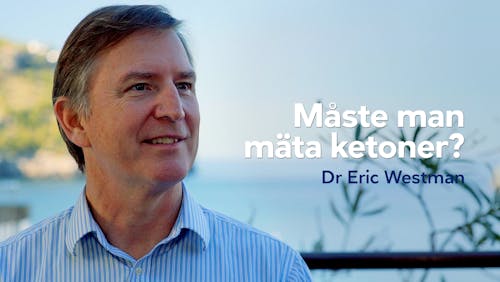
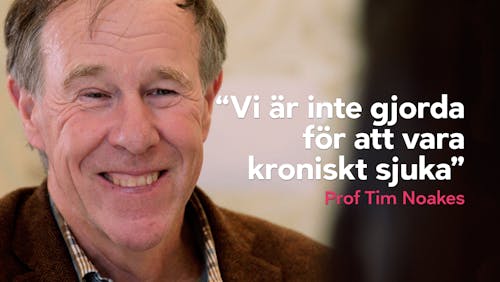
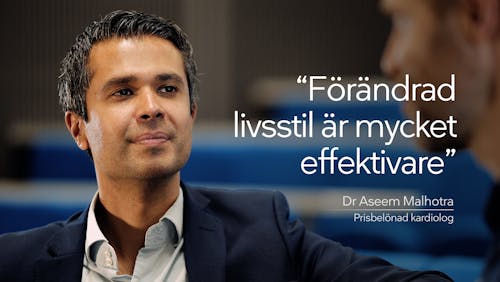
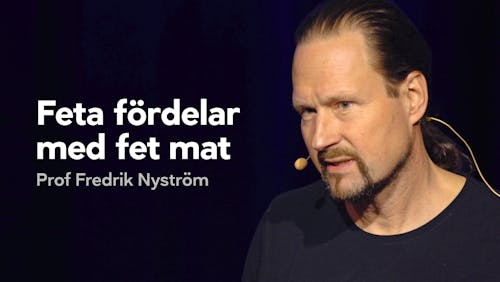
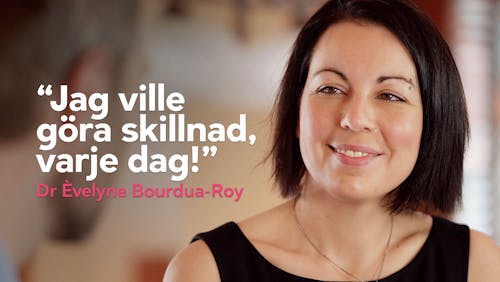
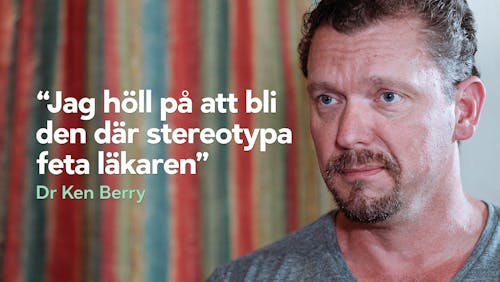

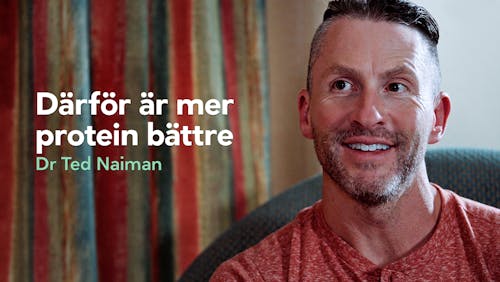
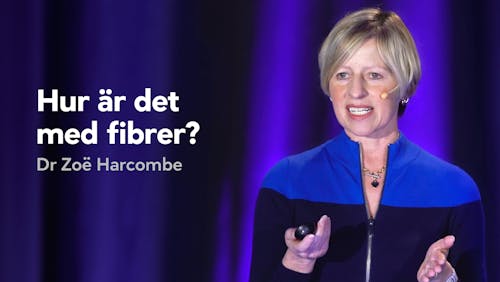
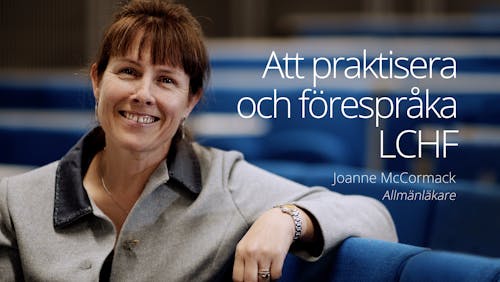
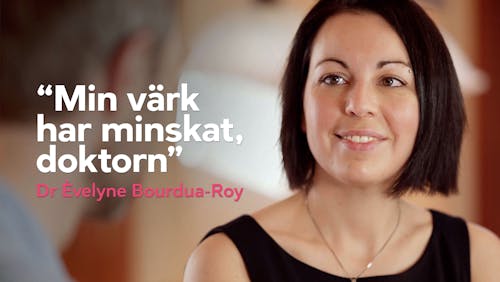
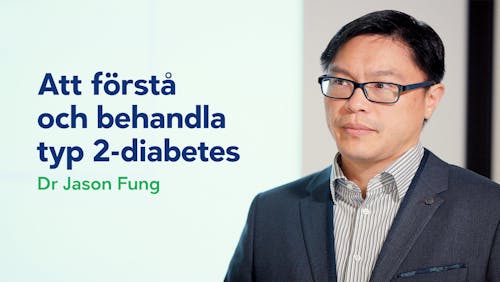
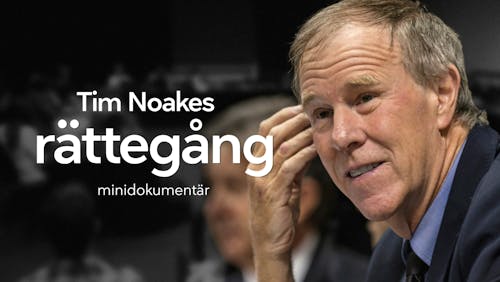
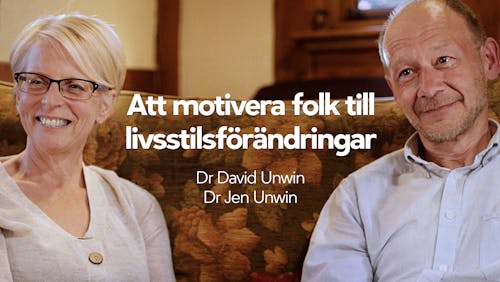
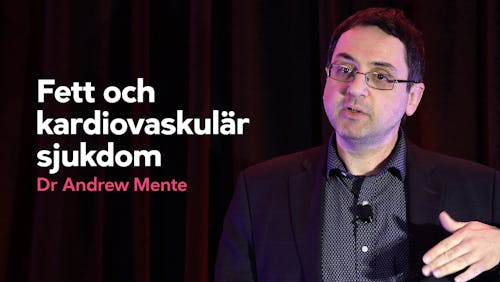
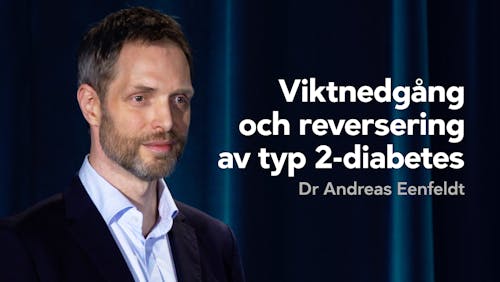
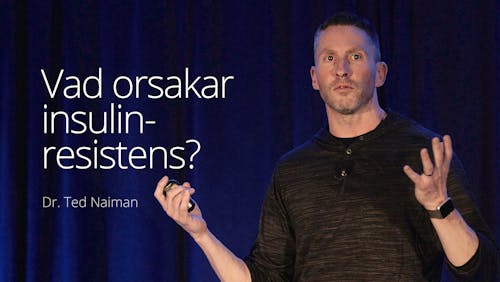
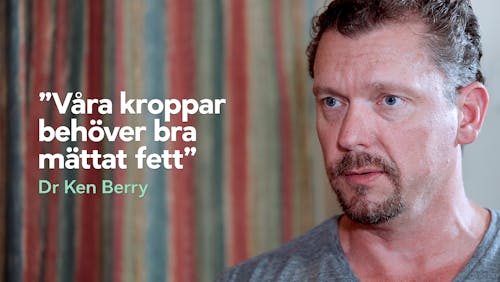
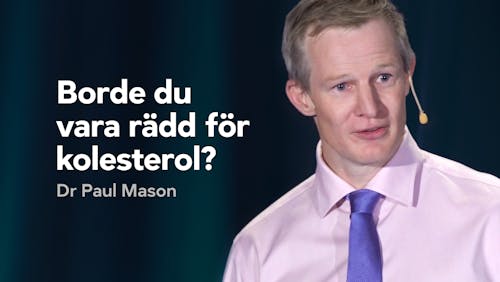
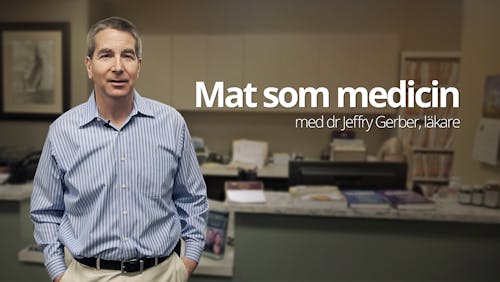
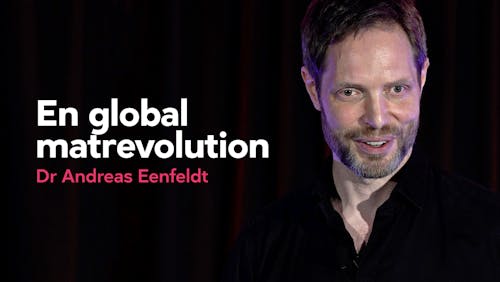
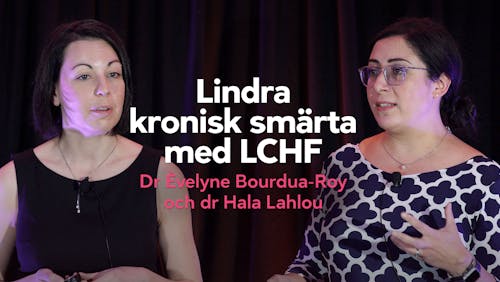
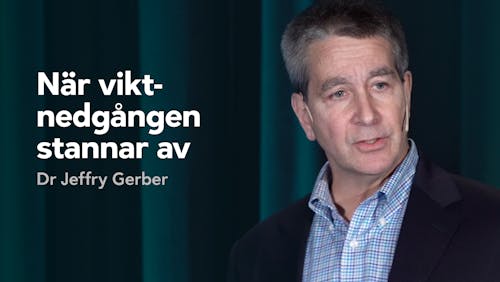

 Kurser
Kurser
